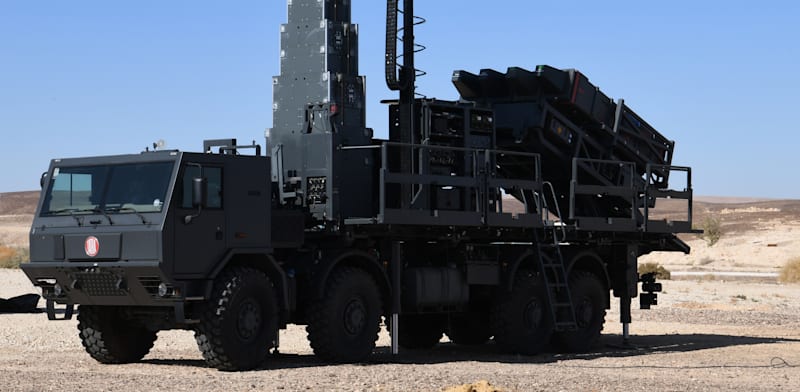
Israeli Spyder Air-Defense Systems
Romania has officially signed a deal worth more than $2 billion with Israel to procure Spyder air defense systems, reinforcing its military’s short-range interception capability. The Romanian Ministry of Defense confirmed the agreement, positioning this deal as the second-largest arms sale in Israeli defense history, following Germany’s $3.5 billion acquisition of the Arrow-3 system.

Spyder Air-Defense System to Strengthen Romania’s Eastern Flank
This strategic purchase of Spyder defense systems underscores Romania’s urgent drive to modernize its air defense in response to growing regional threats. Israel’s Rafael Advanced Defense Systems outpaced European competitors by offering a mobile and combat-proven solution suited to counter threats from drones, cruise missiles, and low-flying aircraft.
The Spyder air defense system uses Python and Derby missiles for short-range interception.
Moreover, it targets low-altitude threats such as drones, helicopters, and cruise missiles.
The system combines Python-4 heat-seeking missiles and radar-guided Derby missiles, integrated into off-road vehicles. This versatility allows rapid deployment and mobility, crucial for reacting to evolving battlefield threats.
Rafael and IAI Lead Israel’s Defense Export Surge
Rafael Advanced Defense Systems will lead the contract for Romania’s Spyder air-defense systems. Meanwhile, Israel Aerospace Industries (IAI) will supply the Elta Multi-Mission Radar (MMR) as a core sensor component. Therefore, we anticipate that IAI will receive approximately $100 million from this high-value contract. As a result, Rafael’s total Spyder-related sales will climb to nearly $5 billion worldwide.
Israel’s Ministry of Defense has heavily promoted the Spyder platform, particularly as drone warfare escalates. Romania’s purchase reflects its intention to prepare for threats similar to those faced by neighboring Ukraine, where loitering munitions and cruise missiles have caused significant disruption.
Delivery Timeline and System Configuration
Romania will receive six Spyder systems for air defense over a period of seven years. The first two batteries, tailored for very-short-range air defense (VSHORAD), are expected to be delivered within three years of the initial contract signing. This gradual rollout ensures integration with existing Romanian command and control infrastructure.
The selected configurations have not been disclosed in full, but they will include both Python and Derby interceptors, ensuring a layered and flexible defense solution. The Spyder system’s proven interoperability with NATO assets makes it an ideal fit for Romania’s expanding defense network.
Broader Implications for NATO and Regional Security
The purchase of Spyder air defense systems by Romania is a clear message to NATO and possible enemies alike. As NATO’s eastern flank continues to face persistent security threats from Russian aggression and hybrid warfare tactics, Romania’s defense posture becomes increasingly vital.

Moreover, this deal strengthens Israel’s status as a reliable defense supplier within Europe. The growing export success of systems like Spyder and Arrow-3 highlights the credibility of Israeli technologies in complex operational environments.
Strategic Impact and Future Developments
In a broader strategic context, the deal suggests that Romania is proactively closing its air defense gaps. The Spyder air defense systems provide a responsive counter to modern aerial threats, including unmanned aerial systems and precision-guided munitions. With a networked architecture and multi-layered intercept capability, Spyder will enhance both national and regional deterrence.
Furthermore, integrating Israeli systems into a NATO framework may foster deeper operational cooperation and technological standardization, potentially setting the stage for future joint procurements among regional allies.







